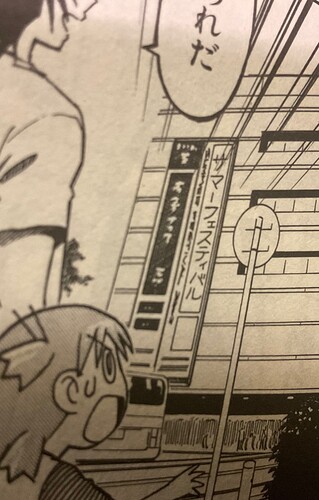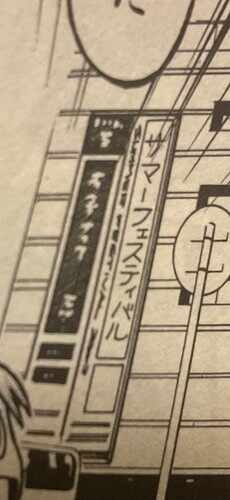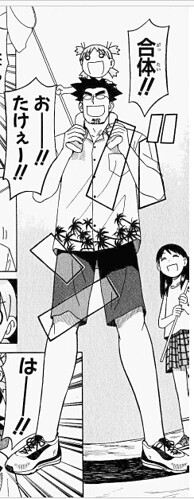I have one line on page 180 where I can’t quite figure out the grammar:
俺はセミを捕らせたらプロ級だぞ。
Why do we have the causative form of 捕る here? Is the meaning something like “When it comes to me, if you make/let me catch bugs, I’m a pro!”?
Would “俺はセミを捕ったらプロ級だぞ” have more or less the same meaning?
Got up to page 179 today. I loved Yotsuba’s utter confidence at her lack of preparedness for cicada-catching.
Somebody here explains it briefly, and my way of understanding it is then, since it’s not something he would do without being prompted, he is in fact ‘being made to’ catch these cicadas.
I believe that the implicit mindset towards the causative being used is that, in cases where it’s not used for permission, the nuance is read as negative. I don’t think this is entirely accurate and it seems that the causative can be used for exactly a situation like this (where a small child is prompting an adult to do some sort of ‘childish’ activity)
Also you were totally right about the セミプロ pun… was too caught up with the other part of the sentence to see past my nose 
I do not think Jumbo is making a very good case for himself with the Ayases this time around 
196-200
拾われっこ - On Jisho, the 9th definition is ‘to take on someone (in adverse circumstances)’, which makes the most sense in this context I think hehe.
I don’t remember if we’ve seen this thus far in this manga or not, but I don’t remember seeing the っ as a replacement for the ending た before. Is this something that can be done wherever or is there a more specific context for it?
Looks like っ子 is attached to things so much, dozens of usages even made it into jmdict: っ子 – Vocabulary details – jpdb
I became obsessed with decoding the name of the デパ-ト they go to. Any thoughts?
This snap from page 149:
The katakana is “サマフェスティバル”
Summer festival? Or is that an event the store is having, and the name is on the other sign (which I gave up on trying to read)?
Hi!
When I saw it I thought “Summer festival” alright, though it doesn’t make sense as the name of the デパ-ト, so I thought it was an event, as the chapter is supposed to take place in summer (くそ暑いわねぇ).
The other sign seems to have a 子 and maybe a 大 in front of it and then some kana?, though I can’t find any word starting by or containing 大子 in Jisho.
Just finished ch 5. My method of reading seems to be not reading everyday, but reading a lot every few days… and still being behind.
My read on this
is that the が出てきて clause means that the freebie egg “appeared”, not “turned out to be”. I’d translate it as “A bonus egg showed up!”
I agree that in this context it’s the “great” meaning of 大変. I’ve had a harder time figuring out the role of the “さー” part, but it’s looking to me like it’s just an exclamation like “hey!”
Exactly --
よーい is 用意, and the whole thing is 用意ドン. I’ve heard this spoken – the whole thing gets the same exact rhythm as “ready, set, go!”
This whole book is giving me life =). I love it when he turns Yotsuba’s head to actually face the direction their house is in 
Another case of… of course that’s a thing  Gonna start slapping っ子 onto the ends of all of my sentences and seeing where it takes me.
Gonna start slapping っ子 onto the ends of all of my sentences and seeing where it takes me.
201-205 / Ch. 7 Start!
トーちゃん’s そんで is apparently 大阪弁, which makes me wonder if there’s been any other 大阪弁 moments before now? Obviously none that I’ve noticed but maybe someone else has picked up on some examples from the earlier chapters?
Hi!
After reading chapter 6, there is only one thing I can say:
I love those big katakana 擬態語 in the middle of the frame! バン
And トーちゃん thinking she caught a bear. 本当にダメだよ、こいつ!
As a matter of fact,
I got the same impression a couple of chapters before. It was a certain word they use, that was attributed in Jisho to 関西弁. Unfortunately, I let it pass without either making a note or making an entry here.
Checking in, did another 6 pages today, so I’m up to p. 185.
This got me wondering. I had intitally read that as him just shortening the word since yotsuba says pretty clearly クマゼミ and just doing that disinterested sort of ‘wowww’ that parents do. Would the more reasonable interpretation be that he misinterpreted what she said?
207-211
On pg. 207, Yotsuba refers to the clouds as 緑色 , this is interesting to me. Is that a common way a Japanese person might describe the sort of dark clouds coming in before a big storm?
Pg. 208, Fuuka says お父さんにいれるよう言っときな, which confused me a bit. Found an explanation here
やってげようか → やってあげようか
Couple other small things after these but were mostly vocab oriented. Today’s reading took quite a while
Edit: While doing my listening practice today, they talked about the usage of 食う「くう」and it made me think of トーちゃん using it earlier in the story. For those interested
Hello! On pg 195 “ジャンボはいっぱいとったな”, is this ジャンボ referring to himself saying that he’s full of catching cicadas, meaning “Lets move on / Lets do something else” ?
I would say it’s more along the lines of よつば saying to ジャンボ that he caught a lot of cicadas.
A small non-japanese indicator here is the font (or I guess line thickness?) of the quote. Yotsuba’s dialogue is frequently written with this sort of thick line, pointing to her being the one speaking here.
いっぱい also does not necessarily mean full, in this case it’s working as an adverb with the meaning of ‘a lot’. Definition 5 on Jisho
Also, I am less sure about this but I remember hearing it, the sort of third person referencing that would be happening here if Jumbo was referring to himself with his own name「ジャンボは」tends to be more feminine and would be an unlikely choice for his character (Someone pls correct me if I’m wrong on this one, but for some reason I have this impression)
212-216
トーちゃん is properly unhinged LOL. Pretty simple pages for today.
One phrase I spent a little time working on was the
「どっちが上でどっちが下だかわかるまい」
Most simply in forgetting what どっち meant for a second… but more fruitfully in figuring out what the まい was doing here. It seems to be this grammar point, although it is not in the deck.
Meaning wise, that would turn it into “I don’t know which way is up or down”, but based on the grammar write up here it seems like a slightly strange use case for it.
I realize I’ve gotten a bit too far ahead… my apologies LOL, but I’ve just been fortunate to have the time to do my 5 pages every day as well as skipping past the no-dialogue pages.
Hopefully my reflections will be beneficial as everybody else gets to the end here. The last few pages don’t pose too many difficult sentences, and for my spoilered part today it only contains bits from pg. 217
217-END
なんだかわからないうちに - I just recently added this grammar point to my reviews, so felt very nice to recognize it in the wild hehe.
ひろったってのは - I have not added this grammar point to my reviews yet, so this took a little more searching. This is another case of bunpro not having the contracted form in the grammar writeup, which is fine but meant that I had to look elsewhere for the explanation. というのは is also just straight up not in the yotsuba deck.
Here is the source I found linking the contraction to the main grammar point
This was a really fun experience and I’m really glad I took part in it. It’s very gratifying to have really genuinely read something in Japanese after all this studying.
I’m gonna switch back to NHK articles for the moment until others finish up, but I’ve bought the second volume so may as well read it once we move on hehe.
Upon re-re-re-reviewing this chapter and our posts, I might have something to add here.
There are two separate grammar points that mean “made to do”, but only one of them carries with it the strong implicit negative connotation, more of a “forced to do.”
The clause “俺はセミを捕らせたら” makes use of the causative auxiliary verb, conjugating 撮る → 取らせる before conjugating that with the conjunction particle たら → 捕らせたら.
The inherently negative way to put this would be by using causative-passive, which, after being combined with たら, would instead conjugate to 撮らせられたら.
I think this is a situation where you just can’t get a translation that’s both literal and natural. Japanese encodes a nuance in a grammar point (the causative), whereas in English there’s no natural way to do that. He’d just say “In that case, you’ve got yourself a pro cicada catcher!” or something like that.
Hi!
Just started chapter 7, the big rains coming.
I had the exact same doubts on those two pages 207 and 208. I haven’t been able to find anything either useful or satisfactory on the 緑色の雲 except maybe this.
Oh boy, do they like their contractions (て+あ = た)!
This last bit must be another contraction!?
In page 209, よつば uses ゆう as another reading for 言う: いそがしってゆってた.
Anyways, poor 風香 is always getting herself involved with the neighbours, 何で私が人んちの洗濯物を… (what would come after this を?).
And よつば always fumbling her words (たとむ for 畳む, こんにやくや for 翻訳家…).
EDIT: こんにゃく happens to be a plant and a jelly made from that plant, 蒟蒻. So in page 212, 風香 wonders if トーちゃん produces this jelly at home.
I think I wouldn’t want to do anything with my neighbors laundry, even see it if at all possible xD



